
Patricia Oren Kearney Cadigan is a British-American science fiction author, whose work is most often identified with the cyberpunk movement. Her novels and short stories often explore the relationship between the human mind and technology. Her debut novel, Mindplayers, was nominated for the Philip K. Dick Award in 1988.
The Prometheus Award is an award for libertarian science fiction given annually by the Libertarian Futurist Society. American author and activist L. Neil Smith established the Best Novel category for the award in 1979, but it was not awarded regularly until the newly founded Libertarian Futurist Society revived it in 1982. The Society created a Prometheus Hall of Fame Award in 1983, and also presents occasional one-off Special Awards.
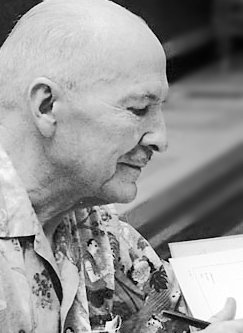
Robert Anson Heinlein was an American science fiction author, aeronautical engineer, and naval officer. Sometimes called the "dean of science fiction writers", he was among the first to emphasize scientific accuracy in his fiction, and was thus a pioneer of the subgenre of hard science fiction. His published works, both fiction and non-fiction, express admiration for competence and emphasize the value of critical thinking. His plots often posed provocative situations which challenged conventional social mores. His work continues to have an influence on the science-fiction genre, and on modern culture more generally.
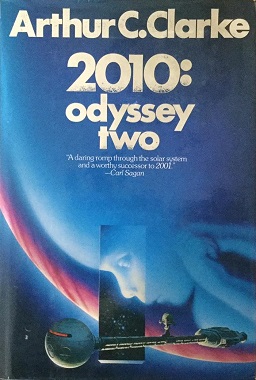
2010: Odyssey Two is a 1982 science fiction novel by British writer Arthur C. Clarke. It is the sequel to his 1968 novel 2001: A Space Odyssey, though Clarke changed some elements of the story to align with the film version of 2001.

The Moon Is a Harsh Mistress is a 1966 science fiction novel by American writer Robert A. Heinlein about a lunar colony's revolt against absentee rule from Earth. The novel illustrates and discusses libertarian ideals. It is respected for its credible presentation of a comprehensively imagined future human society on both the Earth and the Moon.
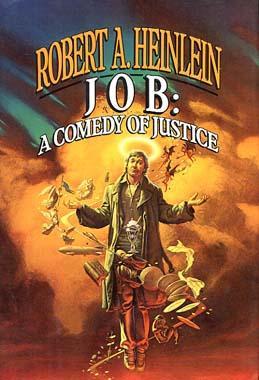
Job: A Comedy of Justice is a science fiction novel by American writer Robert A. Heinlein published in 1984. The title is a reference to the biblical Book of Job and James Branch Cabell's book Jurgen, A Comedy of Justice. It won the Locus Award for Best Fantasy Novel in 1985 and was nominated for the Nebula Award for Best Novel in 1984, and the Hugo Award for Best Novel in 1985.

Foundation's Edge (1982) is a science fiction novel by American writer Isaac Asimov, the fourth book in the Foundation Series. It was written more than thirty years after the stories of the original Foundation trilogy, due to years of pressure by fans and editors on Asimov to write another, and, according to Asimov himself, the amount of the payment offered by the publisher. It was his first novel to ever land on The New York Times best-seller list, after 262 books and 44 years of writing.

Time Enough for Love is a science fiction novel by American writer Robert A. Heinlein, first published in 1973. The book made the shortlist for the Nebula, Hugo and Locus awards for best science fiction novel of that year, although it did not win. It did win a retrospective Libertarian Futurist Society award: the Prometheus Hall of Fame award for 1988.

Farnham's Freehold is a science fiction novel by American writer Robert A. Heinlein. A serialised version, edited by Frederik Pohl, appeared in Worlds of If magazine. The complete version was published in novel form by G.P. Putnam later in 1964.
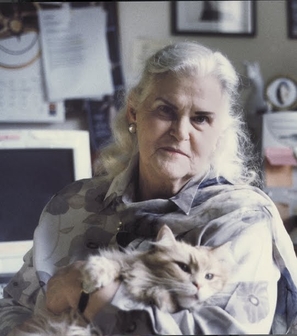
Anne Inez McCaffrey was an American writer known for the Dragonriders of Pern science fiction series. She was the first woman to win a Hugo Award for fiction and the first to win a Nebula Award. Her 1978 novel The White Dragon became one of the first science-fiction books to appear on the New York Times Best Seller list.

John Herbert Varley is an American science fiction writer.

Charles David George "Charlie" Stross is a British writer of science fiction and fantasy. Stross specialises in hard science fiction and space opera. Between 1994 and 2004, he was also an active writer for the magazine Computer Shopper and was responsible for its monthly Linux column. He stopped writing for the magazine to devote more time to novels. However, he continues to publish freelance articles on the Internet.

Joan D. Vinge is an American science fiction author. She is known for such works as her Hugo Award–winning novel The Snow Queen and its sequels, her series about the telepath named Cat, and her Heaven's Chronicles books. She also is the author of The Random House Book of Greek Myths (1999).

Footfall is a 1985 science fiction novel by American writers Larry Niven and Jerry Pournelle. The book depicts the arrival of members of an alien species called the Fithp that have traveled to the Solar System from Alpha Centauri in a large spacecraft driven by a Bussard ramjet. Their intent is conquest of the planet Earth.

A World Out of Time is a science fiction novel by Larry Niven and published in 1976. It is set outside the Known Space universe of many of Niven's stories, but is otherwise fairly representative of his 1970s hard science fiction novels. The main part of the novel was originally serialized in Galaxy magazine as "Children of the State"; another part was originally published as the short story "Rammer". A World Out of Time placed fifth in the annual Locus Poll in 1977.
The science fiction writer Robert A. Heinlein (1907–1988) was productive during a writing career that spanned the last 49 years of his life; the Robert A. Heinlein bibliography includes 32 novels, 59 short stories and 16 collections published during his life. Four films, two TV series, several episodes of a radio series, at least two songs and a board game derive more or less directly from his work. He wrote the screenplay for Destination Moon (1950). Heinlein also edited an anthology of other writers' science fiction short stories.
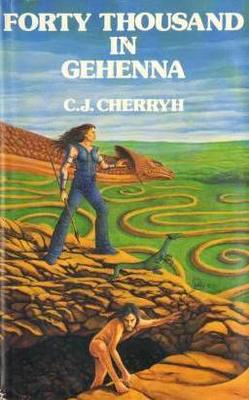
Forty Thousand in Gehenna, alternately 40,000 in Gehenna, is a 1983 science fiction novel by American writer C. J. Cherryh. It is set in her Alliance-Union universe between 2354 and 2658, and is one of the few works in that universe to portray the Union side; other exceptions include Cyteen (1988) and Regenesis (2009).

Old Man's War is a military science fiction novel by American writer John Scalzi, published in 2005. His debut novel was nominated for the Hugo Award for Best Novel in 2006.

Saturn's Children is a 2008 science fiction novel by British author Charles Stross. Stross called it "a space opera and late-period [Robert A.] Heinlein tribute", specifically to Heinlein's 1982 novel Friday.
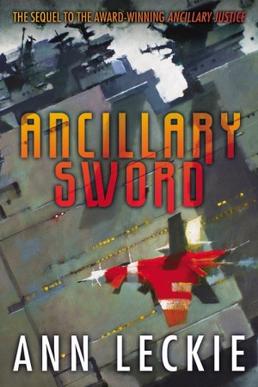
Ancillary Sword is a science fiction novel by the American writer Ann Leckie, published in October 2014. It is the second novel in Leckie's "Imperial Radch" space opera trilogy, which began with Ancillary Justice (2013) and ended with Ancillary Mercy (2015). The novel was generally well-received by critics, received the BSFA Award for Best Novel and the Locus Award for Best Science Fiction Novel, and was nominated for the Nebula and Hugo awards.


















